Trust, power and communication dissonances exist in nearly every workplace, extending from the corporate front office all the way across the global supply chain. Technology interventions are playing increasingly significant roles in attempting to ameliorate employer-employee dynamics. Recently, innovative tech solutions have supported workers, governments, auditors, and corporations fight against the most sinister combination of trust and power issues: forced labour. Broadly defined, forced labour is often found across a spectrum, and can range from decent work on one end to exploitation on the other. This can also mean that a series of exploitative situations may cause work arrangements that begin as consensual and mutually beneficial to devolve into situations which oppress the worker. A wide variety of actors across the labour migration cycle shape each employer-employee relationship.
As you can imagine, the “grey areas” in which forced labour can occur are difficult to identify and constantly changing. In the era of COVID-19 when laborers across global supply chains are facing more difficulty than ever before, case studies proving tech’s role in supporting trust, power, and communication dissonances are increasingly critical for workers, companies, and governments to examine.
On October 8th, in collaboration with the United Nations Innovation Network (UNIN), UNU Macau’s Principal Research Fellow Dr. Hannah Thinyane presented on her Migrant Tech team’s recent work wielding technology to identify forced labour. Developed at UNU Macau and in partnership with Hong-Kong based anti-modern slavery nonprofit The Mekong Club, Apprise was developed as a tool for screening vulnerable populations with the potential to unmask situations of forced labor and human trafficking. Specifically, the webinar focused on a 2019 case study of the Apprise App’s use in Thailand’s fishing center in collaboration with local NGOs, the Royal Thai Navy and the Thai Ministry of Labour across four Port-In, Port-Out (PIPO) centers in Thailand. The webinar’s goal was to share information on innovative and inventive solutions that support the initial screening phase of labour trafficking victim identification.

To build a discussion on trust, power, and communication dissonances in the workplace, Dr. Thinyane explained the rationale behind Apprise’s Thailand study and her subsequent findings. As the highest traded food commodity in the world, seafood is an enormous industry. But as workers often struggle to meet high demands for low-cost seafood, cases of labour exploitation are rampant and often go undetected. After growing global pressure, the Thai government adopted regulatory reforms within domestic commercial fishing and seafood processing industries. To do this, they established 22 PIPO centres as a method of combatting illegal, unreported and unregulated fishing, and underlying exploitative work conditions from their source.
In 2019, the Thai Government undertook a 3-month pilot study at four PIPO centres to understand how Apprise could support worker interviews. Inspectors across PIPO centers responded that Apprise’s post-interview analysis functionality allowed them to identify areas where workers were not able to understand their labour entitlements. The pre-verified translations that Apprise offered allowed interpreters to experience less pressure during the initial and critical phase of victim identification. Critically, Apprise allowed interpreters to focus on more in-depth interviews in cases where vulnerabilities were identified.
Across the board, Apprise studies reveal that most workers are more comfortable using Apprise to answer questions when compared with face-to-face interviews. This is because they often described feelings of greater privacy and thereby retained a greater sense of individual control of the interview process. From the front-line responder perspective, Apprise has been shown to help overcome language barriers, supporting interviews with workers whom they would otherwise not be able to communicate with. Apprise also overcomes training deficits, as organizations can use it to triage cases rather than train every single volunteer on how to become a better first responder.
To better understand how technology can either serve or dismantle the systems of power that build trust and communication dissonance, Dr. Thinyane invited webinar participants to put themselves in a perpetrator’s shoes. “If I was someone who had positive intent to help others, I would use technology to undertake positive intent.” Dr. Thinyane explained. “On the flip side, if I had a negative intent to exploit others, I would also use technology to achieve my goal. Basically, all types of actors use technology as a means to an end for what they want to accomplish.” Dr. Thinyane also warned of the tendency to misconstrue tech solutions are often misconstrued as “silver bullets” to social problems.
In describing another cautionary tale, Dr. Thinyane pointed out that the significance of workplace trust and power imbalances on individual workers often goes under-researched partially because it is often mistakenly sidelined in the West as a “developing world only” problem. In a poll sent out to webinar participants, Dr. Thinyane asked participants to identify the top issue that they faced in their workplaces. Similar to Apprise’s findings from PIPO Centres in Thailand, communication and trust were the two top issues that those watching the webinar experienced in their own workplaces across the world.
Investors, corporations and governments alike are flocking to flashy tech alternatives to traditional auditing and exploitation-observing practices, including blockchain, AI, and expert systems. Naturally, a line of questioning came up on these technologies’ relationships to trust and power in the workplace. Dr. Thinyane was pressed on this when asked about which security vulnerabilities have been identified in using Apprise, and whether or not there have been thoughts of using distributed ledger technology such as blockchain or cryptography to address the trust issues. Building on her earlier points on technology as being a part of a solution – rather than an end-in-itself, Dr. Thinyane acknowledged that frontier technologies can provide much-needed transparency and accountability for workers in exploitative situations. Further, she pointed out that if there are vulnerabilities identified in an interview, there might be a role for a distributed ledger to be built with limited access permissions. This would be critical, she argued, at the follow-up stage of worker exploitation. Once exploitation had been identified using a tool such as Apprise, companies could use distributed ledger technology – such as blockchain – to follow up on worker case complaints. Although there are obvious difficulties when developing a technology that could track individual workers’ claims, Dr. Thinyane suggested that this could be a future direction for blockchain enthusiasts to wield their expertise in support of modern slavery projects.
When discussing future locations of and directions for Apprise, Dr. Thinyane mentioned her interest in innovating tech approaches to combat trust and power issues in domestic work – particularly those impacting migrant domestic workers. UNU Macau’s Migrant Tech Team have worked alongside Hong Kong SAR Civil Society Anti-Trafficking Task Force to develop a list of questions to identify exploitation within domestic work. At the webinar’s conclusion, it was clear that Dr. Thinyane’s good practice recommendations could guide others who are building technology solutions that overcome trust, power and communication imbalances that are currently rampant in the field of forced labour identification.
For more on this conversation, refer to the full UNU x UN Innovation Network webinar here: https://youtu.be/R5wkvDDOa8g
Suggested citation: Sophie Zinser., "Overcoming Trust, Power, and Communication Dissonances: Why Innovative Tech Can Combat Forced Labour," UNU Macau (blog), 2020-10-20, https://unu.edu/macau/blog-post/overcoming-trust-power-and-communication-dissonances-why-innovative-tech-can-combat.



